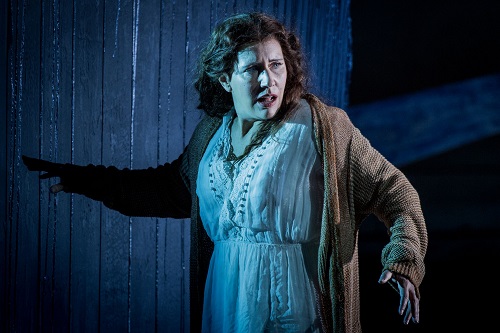 United Kingdom Janáček, Kát’a Kabanová: (Sung in Czech) Soloists; Opera Holland Park Chorus; City of London Sinfonia / Sian Edwards (conductor). Holland Park, Kensington, London, 15.7.2017. (CC)
United Kingdom Janáček, Kát’a Kabanová: (Sung in Czech) Soloists; Opera Holland Park Chorus; City of London Sinfonia / Sian Edwards (conductor). Holland Park, Kensington, London, 15.7.2017. (CC)

Cast:
Kát’a Kabanová – Julie Sporsén
Boris – Peter Hoare
Kabanichka – Anne Mason
Tichon – Nicky Spence
Varvara – Clare Presland
Kudrjaš – Paul Curievici
Dikój – Mikhail Svetlov
Glaša – Laura Woods
Fekluša – Polly Leech
Kuligin – Ross Ramgobin
Woman – Ayaka Tanimoto
Boatman – Michael Bradley
Production:
Director – Olivia Fuchs
Designer – Yannis Thavoris
Lighting Designer – Colin Grenfell
Movement Director – Clare Whistler
Janáček’s masterpiece Kát’a Kabanová was previously seen in Olivia Fuch’s production with designs by Yannia Thavoris in 2008. The setting is the early years of the twentieth century in Russia (no missing the samovar in the “cage” that swivelled to reveal the “room”), but wherever one places the action – based on Ostrovsky’s play – the power is beyond doubt. Janáček’s almost impossibly dramatic score, full of his characteristic composerly fingerprints, asks for extremes from players, singers and, indeed, from us, the audience.
Wonderful to see a packed out “theatre” for this first performance of the run. The staging emphasises the inevitability of Fate – the blue streaks across the stage and the “river” all implying the water that will eventually engulf Kát’a. But that sense of power and inevitability came across strongest via the pit. The intensity of the music seems to reflect the stifling life Kát’a finds herself embroiled in and straining to escape. The chorus when seen on stage seems to underline this, anonymous and perhaps even a little Stetford Wives-ish.
It was Sian Edwards’ conducting that lit the night up, inspiring the City of London Sinfonia to unheard-of heights. Some of Janáček’s writing is little short of cruel (that’s a general comment, also: ask a violinist about the high writing in the Sinfonietta, for example): some of the French horn lines are decidedly unhornistic, yet appeared almost natural on this particular evening. More, Edwards had such a firm grasp of the work’s trajectory. Kát’a’s fate is sealed from the get-go, and Edwards left no-one in any doubt of that.
In terms of diction, words tended to get lost to the extent that at times the opera could have been in any Central European language; perhaps with not a single Czech member in the cast, that is not too surprising but it remains disappointing. It was evident from Paul Curievici’s opening phrases as Kudrjaš; his voice, though, is nice and strong. Making his OHP debut, his sense of line is particularly fine. His lover, Varvara, is superbly depicted by Clare Presland, another OHP debutante who has already appeared at ENO (four parts in Lulu) as well as the Royal Opera at both Hammersmith (4.48 Psychosis) and the Linbury (Glare). Preland shone in her role: one sees her career going from strength to strength. Her contribution to the third act, in particular, was notably impassioned.
And so to the principal lovers. Kát’a’s torment in the second act was one of her finest moments; we feel her conundrum viscerally. Swedish soprano Julia Sporsén, previously a Micaëla, a Gilda and a Nedda for OHP, was fully involved in her tragic part right from the start making her demise all the more harrowing. As her husband Tichon, Nicky Spence gives a splendid reading, full of character and enabling Tichon to be a character we can understand, if not sympathise with. Her lover, Boris, is played by the tremendous, experienced Peter Hoare, making a welcome debut in Kensington, full voiced and commanding.
Almost up there with Kát’a herself was Anne Mason’s Kabanicha. Previously a Kostelnička at OHP and Glyndebourne Touring Opera, she took the role of the hateful mother-in-law of Kát’a here with superb aplomb. Absolutely believable in her railing against the World, she held the stage magisterially.
The smaller roles were well allocated, not least in the shape of Dikoj (the excellent Mikhail Svetlov in properly dictatorial form). All in all, this was one of OHP’s finest evenings. One awaits Tuesday’s first night of Leoncavallo’s Zazà with some impatience.
As a small point in the otherwise exemplary, opulent OHP programme that we all spend time in wonder at. Why is one of the characters listed in the booklet as “Žena”? It means “woman” in Czech and indeed refers to a woman from the crowd. And yet the cast list gives “Boatman” in English rather than the Czech, Rybář, which actually means “fisherman” anyway. Heigh ho!
Colin Clarke